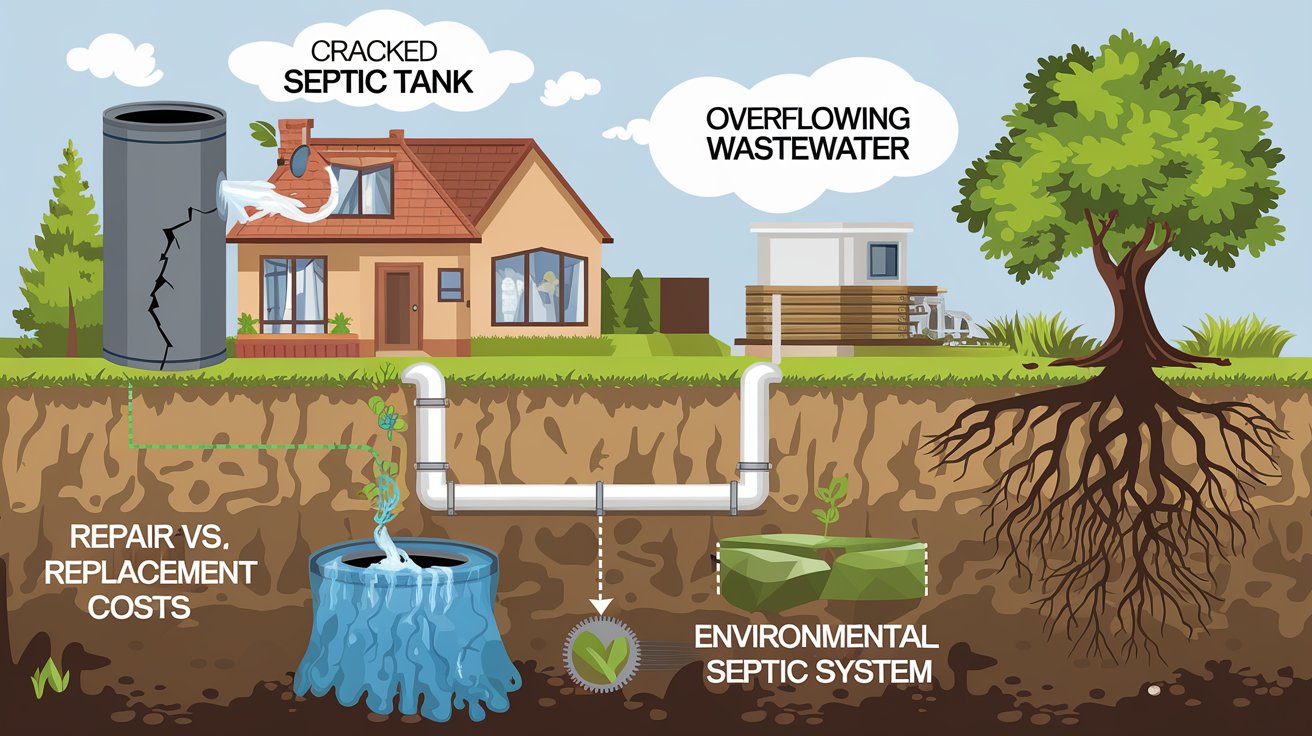Septic tanks are essential for managing household wastewater, but like any system, they can fail over time. Understanding when to repair or replace your septic tank can save you money and prevent costly issues in the long run. While minor repairs may suffice for some problems, in other cases, replacement is the most cost-effective and necessary option. In this article, we’ll explore the signs that your septic system needs replacement, the factors that influence your decision, and how to determine when it’s time to invest in a new septic tank. Whether you’re dealing with frequent backups, age-related damage, or environmental concerns, we’ll guide you through making an informed decision.
- Understanding Septic Tank Failure
- Septic Tank Repair vs. Replacement
- Cost Considerations for Replacement
- Environmental and Legal Factors
- Septic Permit Links by State
Understanding Septic Tank Failure
Common Causes of Septic Tank Failure
A septic tank can fail for several reasons, each of which can require different solutions. Understanding these causes is crucial for deciding whether to repair or replace your system.
- Aging System: One of the most common reasons for septic tank failure is the age of the system. Most septic tanks last between 20 and 30 years, but over time, wear and tear take a toll on the components. An aging tank may become brittle, cracked, or prone to leaks, which can lead to system failure.
- Overloading Due to Excessive Use:
If your septic tank receives more waste than it can handle, it may overflow and fail. This can happen if the system is too small for the household or due to excessive water use, such as frequent washing machine cycles or long showers. - Poor Maintenance: Septic systems require regular maintenance, including pumping out the tank and checking for blockages. Without proper upkeep, waste buildup can clog the pipes, causing backups and system malfunctions. Inadequate maintenance may eventually lead to the need for a full system replacement.
- Structural Damage: External factors like ground movement, tree root intrusion, or natural disasters can cause structural damage to the septic tank and its components. Cracks or leaks can result in effluent leaking into the surrounding soil, creating environmental hazards and reducing the system’s effectiveness.
Signs Your Septic Tank Needs Replacement
Sometimes, the signs of a failing septic tank are obvious, but other times, the issues can develop gradually. Here are some telltale signs that your septic tank may need replacing:
- Slow Drainage or Sewage Backups: If drains in your home are backing up or your toilet frequently clogs, it may indicate that your septic tank is overwhelmed or no longer functioning properly. Even after repairs, these issues may persist if the tank is too far gone.
- Foul Odors Near the Drain Field or Tank: A bad smell around your septic tank or drain field often points to a leak or a system that can’t properly handle waste. Over time, this can lead to hazardous conditions if not addressed promptly.
- Greener, Soggier Areas in the Yard: If the soil over your septic system is unnaturally green or soggy, it could be a sign of a failing tank. This is often due to effluent leaking into the soil and creating an ideal environment for grass to thrive.
- Frequent Repair Needs: If your septic system is relatively young and you just need to delay major issues, a repair may be sufficient.
By recognizing these signs early, you can decide whether to repair or replace your septic system before the problem worsens.
Septic Tank Repair vs. Replacement
When Is Repair the Right Choice?
Not every septic tank issue requires replacement. In many cases, repairing the system can be a practical and cost-effective solution. Here are situations where repairing your septic tank may be the best option:
- Minor Damage or Blockages: If your septic tank is experiencing a minor blockage or issue, such as a clogged pipe or a small crack, repairs may be sufficient to restore proper function. These localized problems can often be fixed without the need for a full system replacement.
- Low-Cost Repairs for Localized Issues: In some cases, specific components like the pump or baffles may be damaged. If the damage is isolated and repairable, replacing individual parts can extend the system’s life at a lower cost than a full replacement.
- Short-Term Fixes to Extend System Life: If your septic system is relatively young and you just need to delay major issues for a few more years, a repair may be enough. Regular maintenance and minor fixes can keep the system running smoothly until you’re ready to replace it.
While repairs may work for small issues, it’s important to consider the long-term viability of the system. Continuous repairs might not always be the most economical choice if the tank is reaching the end of its lifespan.
When Replacement Is the Best Option
In some cases, replacement is the most practical solution. If your septic tank is experiencing one or more of the following issues, replacing the system may be necessary:
- Extensive Damage to Tank or System: If your septic tank has significant cracks, leaks, or structural issues that can’t be repaired, replacement is often the best solution. A severely damaged tank may be beyond repair, and continued patching can cause more harm than good.
- Age of the System (Over 20-30 Years): As septic tanks age, they become more prone to failure. If your septic tank is over 20-30 years old and showing signs of failure, it may be more cost-effective to replace the system rather than invest in repairs that may not last long.
- Multiple System Failures Despite Repairs: If your septic system has failed multiple times despite repairs, it may indicate deeper problems with the system’s design, installation, or materials. Constant breakdowns can be a sign that the system is no longer functioning effectively and needs to be replaced.
- Non-Compliant with Local Regulations: Local regulations often require septic tanks to meet certain standards for environmental protection. If your septic tank is outdated or non-compliant with current codes, it may need to be replaced to avoid fines and ensure the safety of your property and the surrounding environment.
Deciding whether to repair or replace your septic tank depends on the issue’s severity, the system’s age, and long-term maintenance costs. If repairs are no longer effective, replacement may be the best option to ensure the system’s reliability and safety.
Cost Considerations for Replacement
Comparing the Cost of Repair and Replacement
When deciding between septic tank repair and replacement, cost is one of the most important factors to consider. While repairs may seem cheaper initially, replacing an old or severely damaged system can be more cost-effective in the long run.
- Average Costs of Repairs vs. Replacement: The cost of septic tank repairs can range from a few hundred to several thousand dollars, depending on the extent of the damage. Common repairs, such as fixing a broken pipe or unclogging a drain field, can be relatively inexpensive.
If repairs are extensive and major components need replacement, the cost can add up quickly. Replacing an entire septic tank typically costs between $3,000 and $7,000, but it lasts for decades, saving you from ongoing repair costs. - Long-Term Savings with a New System: A new septic system is more energy-efficient, environmentally friendly, and less prone to failure. Replacing an outdated system can save money by reducing frequent repairs and minimizing costly environmental damage.
- Financing Options for Replacement:If replacement costs seem high, many septic companies offer financing options to make it more manageable. Spreading the cost over several years can ease the financial burden, and in some cases, savings from reduced repairs may offset the replacement cost.
Hidden Costs of Postponing Replacement
Delaying septic tank replacement can lead to several hidden costs that may not be immediately obvious. These costs can quickly outweigh the initial savings of avoiding a replacement.
- Increased Repair Costs Over Time: Continuing to repair a failing septic system can be more expensive than replacing it. As the system deteriorates, the cost of each repair can rise, and frequent maintenance may be required to keep the system running. Eventually, these costs can exceed the price of a full replacement.
- Risk of Environmental Damage or Health Hazards:A malfunctioning septic tank can leak untreated sewage, contaminating soil, groundwater, and nearby water sources. Environmental cleanup costs can be high, and delays may lead to health hazards from harmful bacteria or chemicals.
- Possible Fines for Non-Compliance: Many local governments have strict regulations on septic systems, especially regarding environmental impact and performance. If your system is outdated or doesn’t meet local codes, you may face fines or costly upgrades. Delaying replacement increases the risk of non-compliance and legal issues.
Weighing the potential costs of repairs against the benefits of replacing your septic system is crucial. While the initial investment in a new septic tank may seem high, the long-term savings and peace of mind it provides often make it the better financial decision.
Environmental and Legal Factors
Environmental Impact of a Failing Septic Tank
Septic tanks treat and dispose of wastewater, but when they fail, they can cause significant environmental damage. If your septic system isn’t functioning properly, it can lead to pollution and contamination in several ways:
- How Leaks and Failures Affect Groundwater: A malfunctioning septic tank can leak untreated waste into the soil, which may eventually contaminate groundwater sources. Contaminated groundwater can pose serious health risks, as it may affect drinking water supplies for both humans and wildlife.
- Impact on Nearby Water Sources: If the septic tank failure is near rivers, lakes, or streams, untreated sewage can flow directly into these water bodies. This can lead to harmful algal blooms, which deplete oxygen levels in the water and harm aquatic life. It may also result in the contamination of recreational areas, affecting local ecosystems and public health.
- Soil Contamination: Over time, untreated waste can damage the soil around the septic tank and drain field. This contamination can affect plant life, disrupt local ecosystems, and make the area unusable for gardening or other activities.
The environmental risks associated with a failing septic system should not be underestimated.
Replacing an old or damaged tank can prevent pollution and protect your property and the surrounding environment.
Legal and Code Compliance Issues
In addition to environmental concerns, there are also legal reasons to replace an old septic system.
Local regulations protect public health and the environment. Failing to comply can result in fines or penalties.
- Local Building Codes and Septic System Regulations: Many municipalities have specific building codes that dictate the requirements for septic systems.
These codes cover everything from the septic tank size and type to maintenance requirements and replacement timelines. If your tank is outdated or doesn’t meet standards, you may need to replace it to comply with local laws. - Benefits of Compliance for Home Resale Value:
If you plan to sell your home, an up-to-date septic system can enhance its resale value. Buyers prefer homes with a functioning septic system that doesn’t need expensive repairs. A non-compliant system can deter buyers and lower your home’s value.
Replacing your septic system protects the environment and ensures compliance with local laws. It can prevent fines and legal issues, while also improving your property’s marketability.
When it comes to septic tank issues, early intervention is key. While some problems can be resolved with minor repairs, a failing or outdated septic system often requires replacement. Understanding the signs that your septic tank is no longer working efficiently—such as frequent backups, foul odors, or excessive repairs—can help you make an informed decision about when to replace your system.
Replacing your septic tank may seem like a significant upfront investment, but the long-term benefits far outweigh the costs. A new system can save you money by reducing repair expenses, preventing environmental damage, and ensuring compliance with local regulations. A new septic system can also increase your home’s resale value, making it a smart investment long-term.
If you’re unsure whether your septic system needs replacement, it’s always a good idea to consult with a professional. They can assess the condition of your tank and provide expert advice on the best course of action.
Septic Regulations in Rural Areas: Essential Guide for Rural Property Owners
The Role of Perforated Pipes in Drain Fields
What Happens During a Pumping Service?
Septic Tanks vs. Sewer Systems | Choosing the Right Option
Directory | Virginia Septic Service Providers | Part 2
Directory | Virginia Septic Service Providers : Best Professionals | Part 1
Septic Treatments for Odor Control: Best Methods for Eliminating Unpleasant Smells
How to Maintain a Healthy Bacteria Balance | Tips to Ensure Your Septic System Has the Right Microbial Environment









